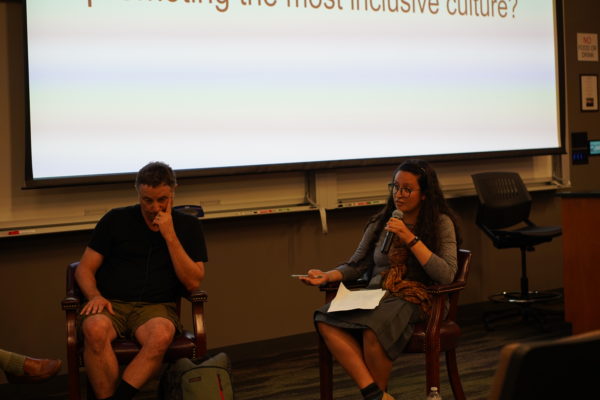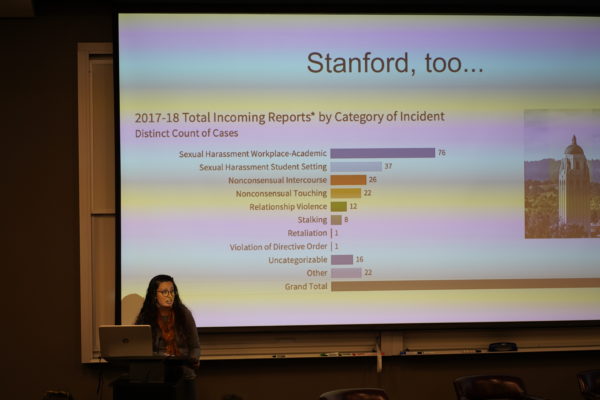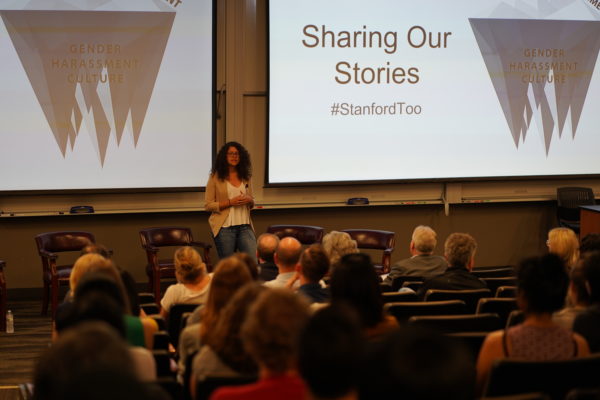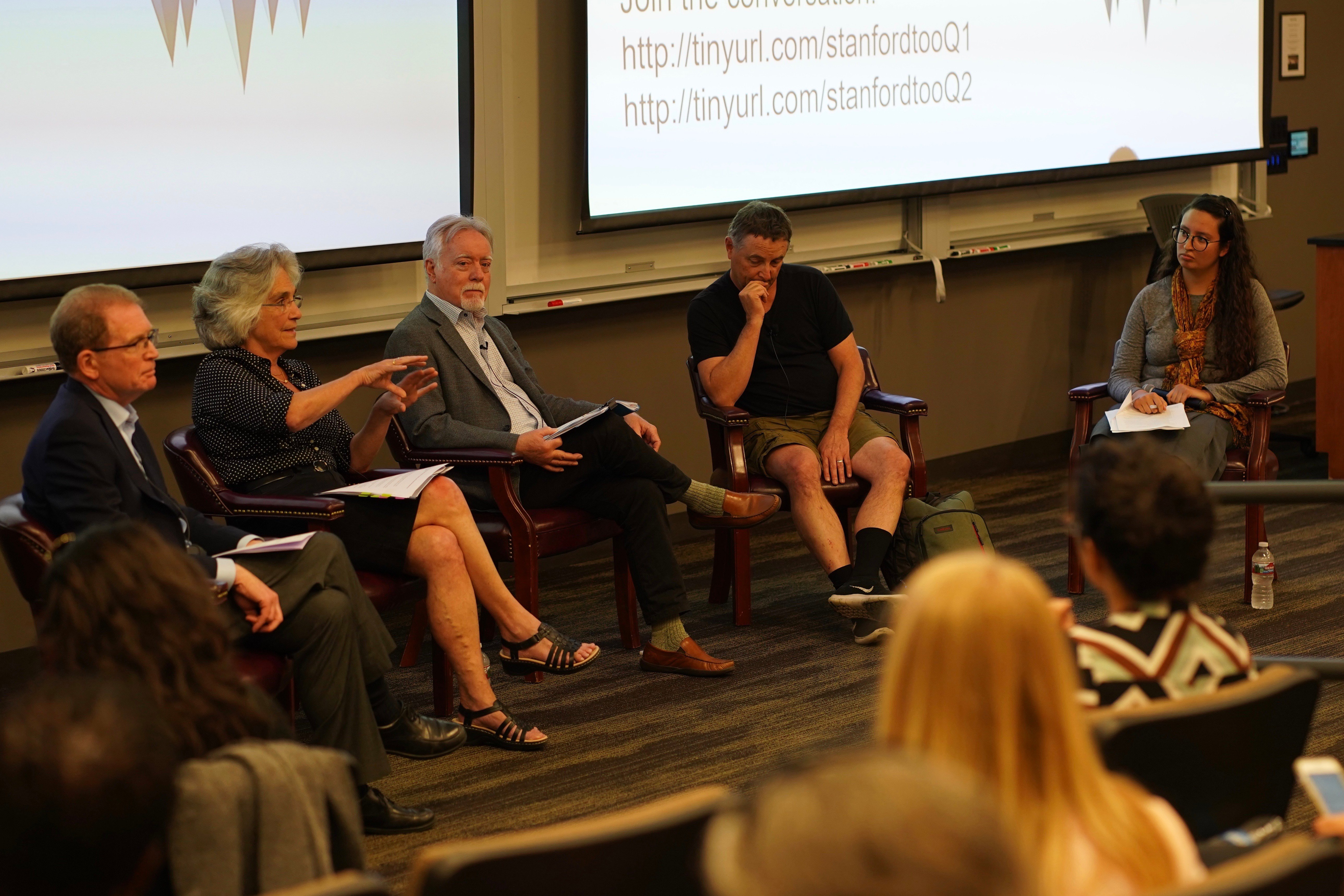After hosting a panel of four Stanford administrators for a “conversation on sexual and gender harassment in [Stanford’s] academic spaces” on April 19, a group of six Ph.D. students is recruiting more members and working on a website with hopes that the April event was the first of many such discussions.
While the event proved popular, students criticized Stanford administrators’ framing of the issues discussed, as well as the fact that three of the administrators left the event half an hour early due to time constraints.
“A lot of people were disappointed in the administrator responses because [they] tended to focus on individual actions like reporting and hiring more female faculty, and not on larger institutional, cultural changes,” said event co-organizer Katerina Gonzalez, a Ph.D. student in earth systems science.
Though it did not provide the answers many students were seeking, the panel centered around a question that they agreed was important: “How can we make Stanford a leading institution in prohibiting harassment and promoting the most inclusive culture?”
April was an opportunity for students and faculty to connect for the first time under the #StanfordToo banner and to begin working toward a common goal. Now, the event organizers are using what they’ve learned since to help shape their next steps.
Limited time, limited answers
The April event included a slideshow, polls and questions for a panel of administrators including Provost Persis Drell, Dean Lloyd Minor from the School of Medicine, Dean Stephan Graham from the School of Earth, Energy and Environmental Sciences and Tom Kenny, Senior Associate Dean for Student Affairs in the School of Engineering. Panelists were asked about Stanford’s plans for institutional change.
According to polls taken at the event, more than two-fifths of the audience believed Stanford departments are not taking “proactive steps” toward addressing sexual and gender harassment. And more than half of the audience members were from the very earth systems, medicine and engineering schools that the deans at the event represented.
“To admonish the victims for not doing enough to change the environment, especially considering that the perpetrators are more often than not entrenched in positions of power, is an absurd position to take,” wrote Morgan (whose name has been changed for this article), a former Stanford Ph.D. student who now works at the University and requested anonymity out of concern that their comments could result in career repercussions.
Attendees also expressed disappointment that three of the four administrators on the panel left at 4:30 p.m., even though the event was scheduled for 3:30-5 p.m., due to time constraints. Drell and Gonzalez separately confirmed to The Daily that the event organizers were aware of Drell’s limited availability before the panel, and had decided to move forward with event planning knowing this. As one of the event organizers, Gonzalez said she had attempted to communicate this to the audience. The organizers had also communicated with Graham and Minor before the event, and were aware of their limited availability as well.

“[The administrators] stood up and said their bit, then took a few anonymous questions, and just as real people in the audience were able to share their stories and ask questions of administrators, they walked out,” Morgan wrote. “This was the first time a conversation like this happened since I’ve been at Stanford; the fact that administrators did not attend the entirety of the meeting shows that addressing sexual harassment in a meaningful way is not a priority to them. Frankly, it was insulting.”
Though some event attendees have remained upset that their questions were not fully addressed, Senior Associate Dean Kenny, who was not originally slated to be a part of the panel, remained at the event and listened to audience questions after the other three panelists left.
“I think that miscommunication was at the heart of the problem,” Dean Graham wrote in an email to The Daily. “Some of the panelists had prior commitments that required departure by a certain time, but apparently the audience wasn’t made aware of that. It’s really unfortunate that, as a result, some in the audience may have felt that the panelists were somehow not committed to addressing the issues in front of us. That is absolutely not the case!”
Gonzalez said she and the other organizers were appreciative of any time the administrators took to appear at the event.
“In wanting to respect the deans’ time, we were prepared to have all of them leave at 4:30 [p.m.], and at the same time were prepared to have them still in the room for listening and discussion if their availability allowed,” Gonzalez wrote in an email to The Daily. “I totally understand that 1.5 hours in the Spring Quarter would have been a time commitment.”
Continued concerns
In addition to their limited availability, some of the panelists’ Q&A responses drew criticism from audience members.
Justine Modica, a Ph.D. candidate in history who attended the event, described a “telling” administrator Q&A response in an email to The Daily: An undergraduate woman asked panelists about what Stanford is doing to ensure the safety of students at campuses where offenders who were asked to leave the University might relocate. According to Modica, Drell told this student that search committees from other universities should ask themselves why prominent academics at the “height of their careers” are suddenly on the job market, and draw conclusions from there.
“The answer was so powerful in elucidating the University’s anemic approach to addressing harassment,” Modica wrote. “Drell basically told us that the University’s official approach to protecting repeat offenders from harassing students at other universities is to encourage search committees to read between the lines.”
Morgan expressed dissatisfaction with Stanford’s alleged signing of non-disclosure agreements with faculty members who are asked to leave due to sexual harassment issues, a process Drell mentioned at the #StanfordToo event. According to Morgan, signing a non-disclosure agreement allows the perpetrator to move to another university or academic setting and continue his or her “troubling behavior.”
While signing non-disclosure agreements may have been in effect before 2019, according to Stanford spokesperson E.J. Miranda, recently enacted California law largely prohibits nondisclosure agreements in these types of cases.
New laws such as SB-820, which went into effect in California on Jan. 1 following a push from the #MeToo movement, “void contractual provisions that would prevent a party from disclosing ‘factual information’ about sexual harassment,” according to the Seyfarth California Peculiarities Employment Law Blog.
The University’s second annual Title IX/Sexual Harassment Report, released by Drell in Dec. 2018, records a total of 221 sexual harassment reports during the 2017-18 school year, 76 of which described sexual harassment in a workplace or academic setting, such as a research lab.

Gonzalez estimates that actual harassment rates may be higher, adding that the issue particularly affects graduate students, since Ph.D. students are part of a “more exacerbated power dynamic” between graduate students and their advisors.
“We can assume a lot of things go unreported because Ph.D. students fear consequences to their careers, and that their complaints may not be taken seriously because of the reputation of the professors they are working for,” she said.
Facing forward
The #StanfordToo April event organizers were Gonzalez; Ana Tárano, a Ph.D. candidate in aeronautics and astronautics; Hanon McShea, a Ph.D. candidate in earth systems science; Dulcie Head, a Ph.D. candidate in geophysics; Sahar El Abbadi, a Ph.D. candidate in civil and environmental engineering and Keyla Badillo, a Ph.D. candidate in genetics.
Gonzalez said their plans for the future include continuing to collect stories and giving voice to those who have experienced sexual or gender harassment, with hopes to rally the community together and find solutions.
“As the audience filtered out of the room [after the April event], there were about ten of us that were still sitting in our seats, flabbergasted by what had just happened,” Modica wrote. “So we started talking and got each other’s contact information, and we realized that the administration isn’t going to protect us, we have to protect each other. The conversation is definitely continuing.”
Earth System Science Department Chair Rob Jackson, who attended the April event, wrote in an email to The Daily that his department is initiating several new activities in the spirit of #StanfordToo, including crafting an updated code of conduct and organizing a departmental retreat.
“Harassment still occurs at Stanford and elsewhere and needs to stop,” Jackson wrote.
In a separate statement to The Daily, Dean Minor wrote that he is committed to fostering a safe, respectful and inclusive environment for Stanford Medicine.
“I was honored to participate in this important event,” Minor wrote. “It is my goal that these conversations continue with the engagement of the entire Stanford Medicine community, including students, trainees, faculty, and staff.”

The #StanfordToo organizers are currently compiling a repository of stories spanning “garden variety” gender harassment and sexual harassment — stories that were shared by students and collected anonymously at the April event. They plan to share some of these stories on their website, as permitted by those from whom the stories were collected.
One story involves a female student who was asked by a professor about how many children she has, and about her plans for starting a family in the future. Another includes a student who noticed a disparity in the assignment of more “domestic” lab responsibilities — such as ordering food and secretarial matters — to women rather than men. A third concerns a woman who learned that her male colleagues earned more for the same position, experience and work.
The organizers also collected a story from a female student who experienced sexual harassment on a departmental retreat: She was watched, followed and physically intimidated by a man whose invitations she had rejected, and she is now dreading the next retreat.
The National Academies of Sciences, Engineering, and Medicine’s 2018 report “Sexual Harassment of Women,” which says gender harassment is more prevalent in STEM fields, is an important resource for the #StanfordToo movement, Gonzalez said. Audience members at the April event were encouraged to read the report, advocate for funding and demand “civility and bystander training” in their departments.
“The StanfordToo event highlighted that it will take all of us as a community working together to raise consciousness, to hold each other accountable, and to celebrate each other’s differences rather than devalue them,” Drell wrote in an email to The Daily. “I look forward to more events like StanfordToo to continue this dialogue with students.”
Drell added that she wants students to be aware of the Confidential Support Team, a free and confidential team of therapists offering help to Stanford students impacted by sexual harassment or violence: “No one needs to suffer in silence.”
Contact Anishi Patel at anishi.patel10 ‘at’ gmail.com.
